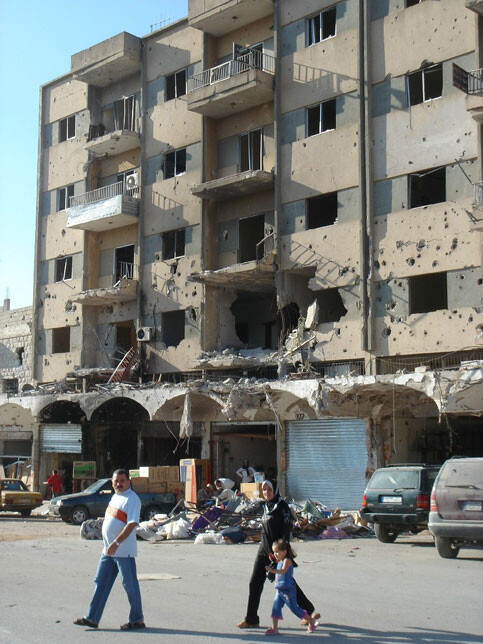IRIN 20 September 2006

Lebanese walk in front of a building damaged by Israeli attacks. (Misbah Hammoud/IRIN)
As Lebanon rapidly moves further away from its humanitarian emergency phase and closer to early recovery, the Lebanese government is keen to show that it is able to manage all the country’s relief and reconstruction needs.
“We are self-reliant,” said Yehia Raad, secretary general of the Higher Relief Council (HRC), a government body. “We have received a lot of [external coordination] help, some of which was necessary during the war. Now, it is more than fair to say that we are fully capable of working independently, while meeting all of everyone’s needs in war-affected areas.”
Raad’s comments came as David Shearer, the United Nations humanitarian coordinator for Lebanon, prepared to leave.
“At this stage, as the early recovery effort picks up and the humanitarian operation is slowly winding down, it becomes possible for the humanitarian coordinator to leave,” Shearer said on Tuesday. “The government wants to be in the driver’s seat, and that is a good thing.”
The UN’s emergency humanitarian operations in Lebanon - which began soon after the 34-day war between Israel and Hezbollah began on 12 July - will officially end on 24 October.
However, international agencies will continue to provide assistance with food, medical supplies, water and non-food items and services where needed, Shearer added. What will change is that Lebanese authorities will take over the management and distribution of aid.
“At the moment, for example, we’re still trucking water to over 100 villages,” he said. “We envisage that within one or two months that will no longer be necessary.”
To date, the HRC says it has distributed more than 571,000 weekly adult food baskets, 27,000 weekly children’s food baskets, almost 600,000 hot family meals and 142,000 mattresses. In addition, it has done “tremendous amounts of work so far to repair vital roads, electricity and water systems”, said Shearer.
In the south, however, there is still a sense of uncertainty among many of the most affected communities about the government’s capacity to meet all needs in the coming months, with more confidence being placed in Hezbollah-led efforts and local community initiatives.
“While the state may be seen to be providing the most basic services, it will most likely be that Hezbollah will, as it has done in the past, exert more of an effort to truly accommodate the total needs of the population in the more affected areas,” said Amal Saad Ghorayeb, a Hezbollah analyst.
Whether the Lebanese government or Hezbollah’s social services arm undertake recovery work, the country’s citizens are confident that the job will be done.
“The people are confident, with pledges for reconstruction both by Hezbollah and the government, that we will manage to recover fully very soon,” said Mohamed Abdullah, deputy mayor of the heavily damaged town of Al-Khiam, 100 km south of Beirut.
“Community efforts have been impressive, with the municipality funding much of its own work and the local population taking part all round,” he added.
This item comes to you via IRIN, a UN humanitarian news and information service, but may not necessarily reflect the views of the United Nations or its agencies. All IRIN material may be reposted or reprinted free-of-charge; refer to the copyright page for conditions of use. IRIN is a project of the UN Office for the Coordination of Humanitarian Affairs.
Related Links